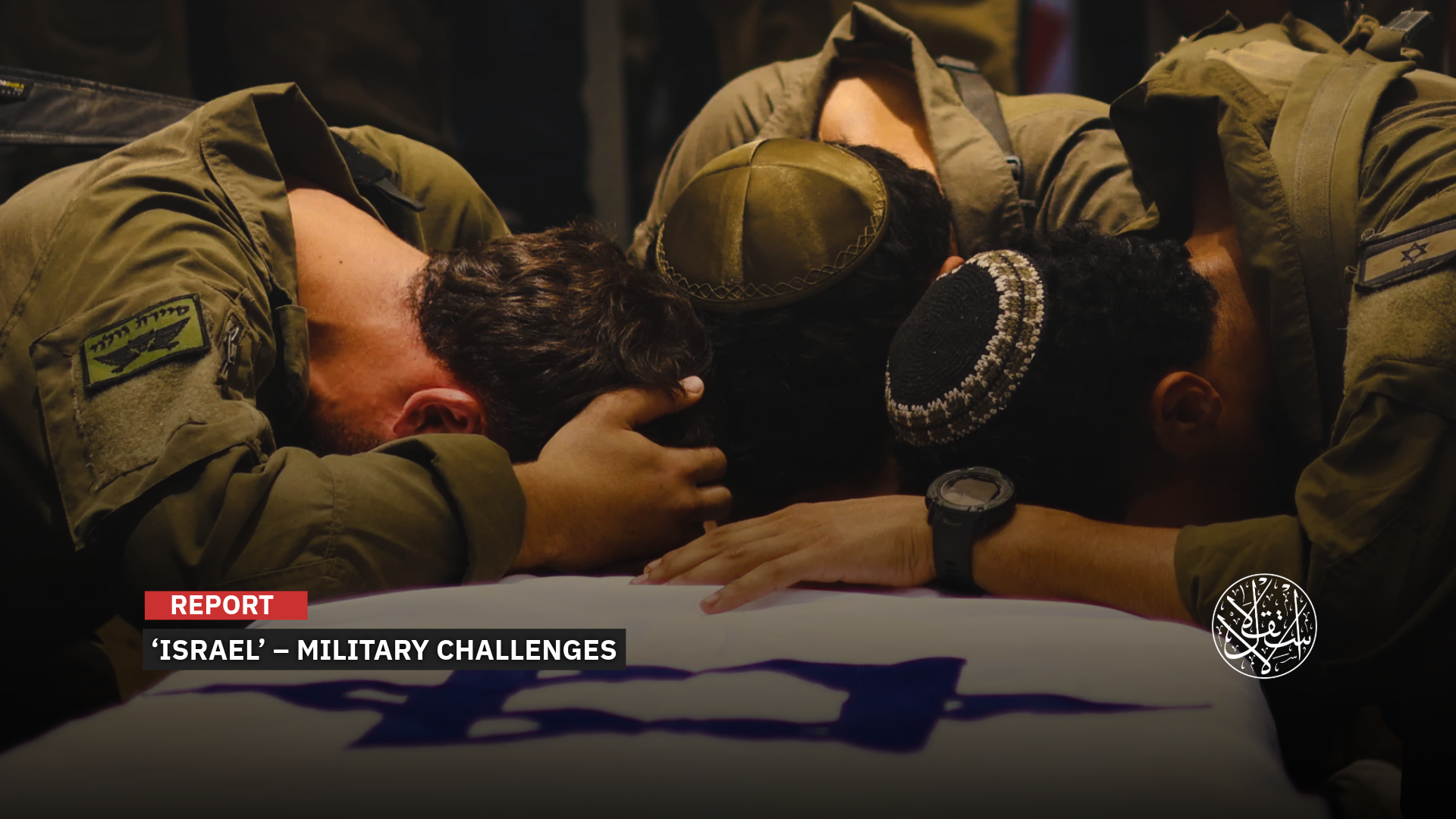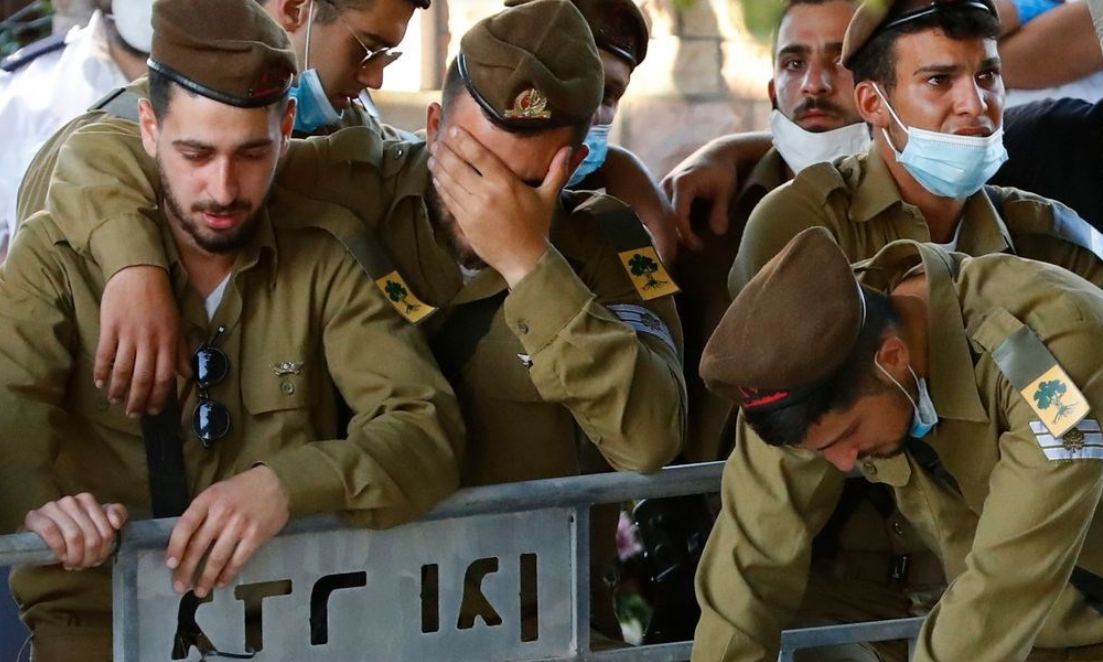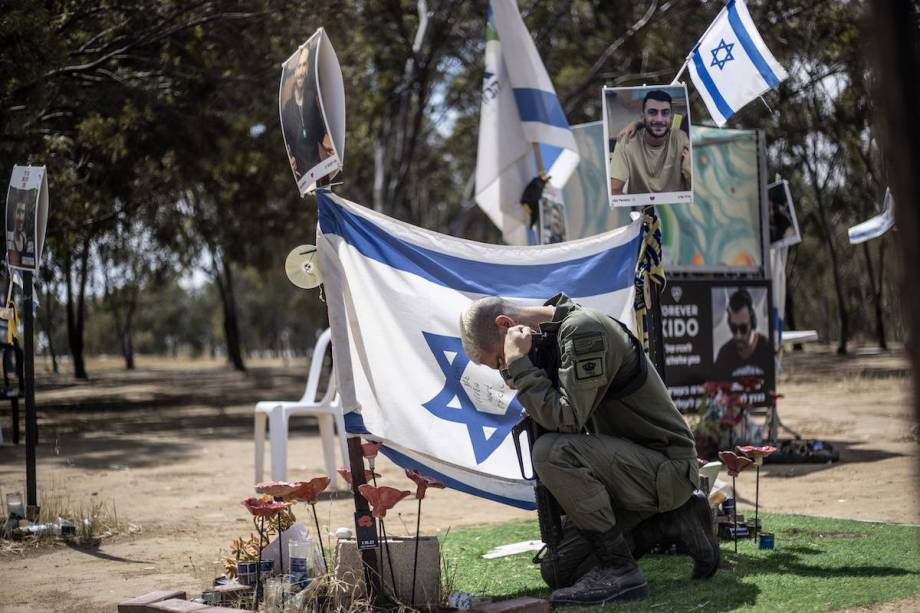How the Gaza War Psychologically Traumatized Israeli Soldiers and Officers

“From 2017 to July 2025, 124 Israeli soldiers died by suicide.”
Since the start of the Gaza war, the Israeli army has been under unprecedented pressure, suffering continuous casualties, psychological strain, and relentless attrition on the battlefield. This is compounded by a decline in confidence in its senior leadership and a deep political divide that is splitting “Israel” in two.
According to Israel's Channel 12, thousands of soldiers of various ranks, from captain to lieutenant colonel and above, are demanding to end their service and withdraw early from the army. Other reports have revealed a rise in the number of officers and soldiers seeking psychological support.
It confirmed that the reasons for the crisis are multifaceted, including the exhaustion of the war, poor service conditions, low salaries, and political infighting.
For his part, Israeli Chief of Staff Eyal Zamir acknowledged a deep crisis gripping the army, indicating that it is forcing them to promote unqualified and inexperienced officers.
In an attempt to contain this unprecedented crisis, Benjamin Netanyahu's government announced the allocation of more than $1 billion in incentives for soldiers, stating: “We stand by the backbone of the Israeli army.”
Psychological Crisis
The phenomenon of suicide among Israeli soldiers is worsening, fueled by their deteriorating mental health, two years after the war in the Gaza Strip, and amid a strict media blackout imposed by the security establishment.
It appears that the data published on this matter represents only a fraction of a complex crisis, the majority of which the military is concealing from the public.
A former police officer, who served in the reserves during the Gaza war, set himself on fire in front of the home of a senior official in the rehabilitation department of the Ministry of Army in yet another suicide attempt.
This incident sounded the alarm regarding the situation of tens of thousands of veterans of the Israeli war in Gaza, prompting a Knesset committee to investigate the matter and prepare a detailed report.
The committee confirmed that 279 soldiers attempted suicide over the past 18 months, a 56% increase in the number of suicides compared to the period before the war.
According to military data, 78% of the soldiers who committed suicide in 2024 were combat soldiers.
A report issued at the end of October 2025 by the Knesset Research and Information Center indicated a sharp increase in the number of Israeli soldiers attempting suicide during wartime.
According to the report, which is based on official army data, 124 soldiers committed suicide between 2017 and July 2025.
The Israeli Ministry of Army justified the increase in suicides by linking it to the increased number of soldiers participating in the war.
Israeli media outlets reported warnings from mental health experts that the greatest danger in this area will become apparent soon after the war ends.
Another alarming statistic in the report highlights the severity of the suicide problem, particularly among combat soldiers.
Between 2017 and 2022, the percentage of combat soldiers who committed suicide ranged between 42% and 45% of all soldiers who took their own lives.
However, in 2024, this figure reached 78%, a percentage significantly higher than the percentage of combat soldiers in the Israeli army.
According to the report, since 2017, 68% of suicides were among conscripts, 21% among reservists, and 11% among regular soldiers.
Since the beginning of the war, the suicide rate among reservists has risen sharply, coinciding with a significant increase in their overall number.
It should be noted that the report only includes reservists who committed suicide while on active duty, while other cases may have occurred before or after their service due to the associated psychological distress.

Profound Failure
According to the Israeli newspaper Haaretz, a high-ranking reserve officer in the Air Force committed suicide weeks ago after serving in the drone unit involved in the Gaza offensive.
Despite weeks having passed since his suicide, and the lack of any official announcement, the newspaper reported that the officer had suffered deep psychological trauma due to witnessing the killing and destruction he experienced while performing his military duties during the war on Gaza.
His colleagues reported that in recent months he appeared to be gradually deteriorating, unable to cope with the atrocities committed in Gaza, where he oversaw drone launches and monitored the results of bombings in real time.
They indicated that the officer had been receiving psychological treatment before his suicide and that the army was aware of his condition but did not remove him from his post, considering him indispensable during the multi-front war.
According to other officers who spoke of a broader phenomenon within the Israeli army's drone units, many personnel are facing moral crises after witnessing and overseeing bombing operations that have killed thousands of civilians.
The newspaper quoted an officer from the army's medical unit as saying that the high-ranking officer's suicide reveals the system's failure to assess psychological risks, adding that daily exposure to scenes of killing and the lack of support after service creates a deadly mix of isolation and guilt.
Officers who served in the same unit also confirmed this. Many feel today that they have been left alone with memories and nightmares, and that some are grappling with suicidal thoughts after the war ended.
In turn, the French newspaper Le Figaro highlighted the mental health of Israeli soldiers, recounting the story of a soldier whose frustration and despair reached such a point that he wished to be shot in the forehead.
The newspaper quoted the soldier, a combat medic on the Gaza front, as saying: “One of my dreams is to be shot between the eyes. I am a walking corpse.”
It noted that the soldier is now unfit for military service, suffers from post-traumatic stress disorder, and recently appeared before Knesset members, shouting at the politicians that he was no longer fit to live.

Suicide Attempts
The Israeli newspaper Yediot Ahronot published a report highlighting the increasing number of suicides within the Israeli army, particularly among reservists.
It argued that this phenomenon poses significant risks to “Israel”, despite the army's downplaying of its importance and its attempts to explain it by citing the increased number of reserve mobilizations since the start of the war.
It quoted Israeli expert Yossi Levi-Belz, who warned that “Israel” could face a major wave of suicides.
According to data revealed by Israeli media, more than 10,000 soldiers are still receiving treatment for psychological trauma, while only 3,769 soldiers have been officially diagnosed with post-traumatic stress disorder (PTSD) and are receiving specialized treatment.
For weeks, soldiers suffering from PTSD have been staging a sit-in outside the Israeli Knesset to protest the lack of recognition of their suffering and to demand a reduction in bureaucratic hurdles related to mental health care.
A recent military investigation found that most of the recent suicides among troops were the result of psychological trauma from the war, including prolonged deployments in combat zones, witnessing harrowing scenes and the loss of comrades.
According to data from the Israeli Ministry of Army, approximately 80,000 Israeli soldiers are receiving treatment in rehabilitation centers, including 26,000 suffering from severe psychological disorders as a result of the trauma and combat they experienced in recent years.

Widespread Repercussions
Despite the Army of Defense acknowledging that the scale of the crisis exceeds the capabilities of the health and military establishments, the army has quickly recruited hundreds of mental health officers to address the repercussions of the ongoing war on multiple fronts.
Experts have also been deployed to the front lines to assist soldiers during combat, a hotline has been established, and group therapy sessions are being provided for soldiers after their service ends.
However, experts warn that “Israel” is not yet equipped to handle this level of psychological trauma, a gap acknowledged by the Rehabilitation Administration, which stated that the crisis is affecting the entire national health system.
The Associated Press quoted several soldiers and psychologists as saying that many soldiers lack purpose, find it difficult to concentrate or form relationships, and are gripped by a growing sense of despair as the war continues.
In a related context, a new study published by the Israeli Central Bureau of Statistics revealed that a third of the wives of reserve soldiers are considering separation or divorce due to the repercussions of extended military service on family life.
According to Channel 7, data from a recent survey showed that nearly half of the husbands reported damage to their marital relationships, while a third indicated that this damage has led them to consider separation or divorce.
The head of the Committee for the Advancement of the Status of Women, MK Meirav Cohen, warned that the harm inflicted on the wives and families of reserve soldiers points to a widespread and profound crisis.
Amid the escalating psychological crises, the Israeli organization Al Sam, which specializes in treating drug addicts, revealed that 13% of those undergoing addiction treatment are children of reserve soldiers who fought in the last war in Gaza.
It also clarified that 18% of soldiers who served in the Gaza Strip already suffer from addiction, while others have turned to marijuana and other drugs.

Israeli analysts believe this crisis could pose a serious strategic challenge to the army, given the escalating regional tensions on the Gaza, Lebanon, and West Bank fronts.
They point out that declining morale and a diminished desire to remain in the military threaten to undermine the army's ability to sustain long-term operations.
A previous report by the Hebrew newspaper Yediot Aharonot warned that the war of attrition in Gaza would crush the soldiers and lead to collapse, criticizing the exemption of tens of thousands of Haredim from participating in the war, and stressing that this increases the burden on secular soldiers.
For his part, political analyst Ismail Masalmani told Al-Estiklal that “these shocking statistics reveal a hidden aspect of the repercussions of the ongoing military operations, as their effects are not limited to the battlefield alone, but extend to impacting the psychological and social well-being of soldiers and their families.”
“The Ministry of Army says it is working to increase psychological support programs and expand treatment centers, but I doubt the ability of these measures to contain what is the most serious crisis in the history of the Israeli army,” he said.
Sources
- 279 IDF soldiers attempted suicide since start of 2024, Knesset report finds
- Without human capital, there is no army
- An Israeli Drone Operator Couldn't Bear His Role in the Gaza War. 'Moral Injury' Made Him Take His Own Life
- Israel says nearly 80,000 soldiers rehabilitated since start of Gaza war
- Thousands of permanent personnel requested early release from the Israeli army [Hebrew]










